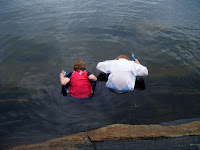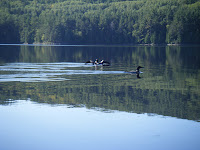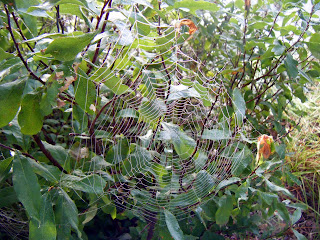My kids and I have recently discovered a new natural playground. The tree of us are overjoyed at the possibilities this brings for the coming summer. I envision hanging out under a tree quietly observing the wildlife; my youngest is excited about floating homemade boats in the creek and my eldest has some serious fort building planned.
This summer the kids will be spending a couple of weeks at residential camp. My eldest went last year, but this will be the first time for my youngest.
While it is hard for me to let go (being rather kid-like myself, I do envy them a little!), I am very pleased to be able to provide them with the experience.
Traditional summer camp offers kids a chance to be a part of a group in an informal way, with less imposed structure than in most other places. It gives them a chance to try and learn new skills on their own terms, and to figure out who they are and what makes them tick. It is a chance for them to learn and practice leadership and cooperative skills that are lacking in most kids lives. The atmosphere puts kids less on the defensive, and asks both less and more of them as a result. Kids are given the opportunity to create their own expectations of themselves away from teachers and parents, in a safe, but open and accepting environment, away from imposed adult expectations.
Of course, not all camps are like this--there are elite arts and sports camps, as well as tutoring camps, day camps that are an extension of daycare, etc. which all have different sorts of agendas. The value of these camps lies in other areas, and these are not the camps I refer to.
Another aspect of the summer that I anticipate with enthusiasm is canoe season.The kids have spent hours floating tiny stick boats behind the canoe, and dropping rocks into the lake as we travel. We spend much time singing together as we paddle too, and we go through several kilos of gorp each trip. For dawn and dusk paddles, we try to be as quiet as possible as the kids point out wildlife. Since their eyes are keener than ours, they often see things we'd otherwise miss.
At the campsite, they have spent hours exploring the water with their snorkels and the land with cameras, binoculars and magnifying glasses. If we have a site with a slope to the water, the use their buckets to create waterfalls and stick/needle dams. They collect firewood on our fire night (we traditionally have one small camp fire each trip if there are no fire bans on), and search for animal burrows and pick up any garbage left behind by previous campers. It becomes like a scavenger hunt.
The kids also enjoy setting up the tents while we hang the food ropes and start getting supper ready. Soemtimes one of them takes a bread to pump water and look for loons.
Even if back country camping isn't your thing, you can still spend time as a family enjoying the nature around you by going for nature hikes and playing in the sand at the beach with the kids. Let the kids lead the way, but encourage them to try new things and leave their toys and gadgets at home. The best and most creative play comes from the environment. Aside from a couple of buckets and shovels, nothing from home is needed to create a magnificent walled sand city, or a vast interconnecting canal system.
If you do spend much of your time in the sun, be sure to clothe the kids in SPF clothing and broad-rimmed sunhats. Research your sunscreens before buying--some create more problems than they solve. We like Badger sunscreen and Mexitan, although we found that Mexitan tended to go a little crumbly after a while. Check out this link for a sunscreen comparison chart: http://www.ewg.org/cosmetics/report/sunscreen09/findyoursunscreen?&overall=g&&showall=1
If your family spends most of their time exploring the forest, be sure to wear lightweight long sleeves and pants for insect protection. Some swear by deet, others by citronella; some say eating extra garlic and increasing your B vitamins helps. I have tried all of these, but the only thing that works for me is clothing coverage. You will need to experiment to see what works for you. Be sure to minimize your use of deet if you do find it works for you as it absorbs into the skin and can be fairly toxic, esp. for kids. It will also melt various plastics on contact, and may react with synthetic clothing and cosmetics/sunscreens. Try spraying it onto cotton socks and sweatbands and the brim of your sun hat instead of directly onto your skin.
For more camping tips, tricks, recipes etc., see the Lemonade camping pages: http://greensim.com/lemonade/camp.html
Copyright note: this is a friendly reminder that all images are the property of the blog owner and may not be used without prior consent. If you want to use an image posted here, send me an email and tell me why you want to use one of my images, and wait for and respect my response please!
Wednesday 7 April 2010
Tuesday 6 April 2010
Cool Poem to Share
As found in a newletter from our organic food supplier:
If the sight of the blue skies
fills you with joy,
if a blade of grass springing up
in the fields has power to move you,
if the simple things of nature have a
message that you understand,
rejoice, for your soul is alive.
~Eleonora Duse
The world is mud-luscious and puddle-wonderful. ~e.e. cummings
If the sight of the blue skies
fills you with joy,
if a blade of grass springing up
in the fields has power to move you,
if the simple things of nature have a
message that you understand,
rejoice, for your soul is alive.
~Eleonora Duse
The world is mud-luscious and puddle-wonderful. ~e.e. cummings
Labels:
earth day,
Elenora Duse,
nature,
poetry,
spring
Scratch Programming and Other Great Free Online Resources
My kids have been using MIT's free Scratch Programming language for a few years now. It's cute. It has click and drop pieces of code that look like Lego. You can make loops, if/then statements and perform many other standard programming tricks. The kids have each made several movies and games now.
Maybe it is the way they spend hours absorbed in it that I started to think of it as a game rather than an educational tool (a line which is pretty grey at the best of times). Then my DH came home with a survey from work (written by a software developer) that asked participants to tick the languages they used regularly. Along with C, C++, Fortran etc., Scratch was listed. Was this a joke or was it for real? Neither my DH or the kids has yet found a limit as to what they can use it for, so perhaps it is "for real".
Either way, having taken another look at it, I have to say that it is quite impressive and much more sophisticated than it would seem at first glance, yet it is simple enough that my kids could manage to use it from the time they were about six years old.
Here's the link for a free download and tutorial: http://scratch.mit.edu/
We have been incredibly fortunate to have started our homeschooling quest in a time when there is so much available, usually for free, on the internet. One other goldmine of educational resources has been (and will continue to be for a while here!) open courseware. MIT offers some, and so do many other universities worldwide. Here's a huge list of links to courses offered: http://www.collegedegree.com/library/college-life/the_ultimate_guide_to_using_open_courseware
These plus many more links are also available on my Educational Resources page.
I hope you enjoy!
Maybe it is the way they spend hours absorbed in it that I started to think of it as a game rather than an educational tool (a line which is pretty grey at the best of times). Then my DH came home with a survey from work (written by a software developer) that asked participants to tick the languages they used regularly. Along with C, C++, Fortran etc., Scratch was listed. Was this a joke or was it for real? Neither my DH or the kids has yet found a limit as to what they can use it for, so perhaps it is "for real".
Either way, having taken another look at it, I have to say that it is quite impressive and much more sophisticated than it would seem at first glance, yet it is simple enough that my kids could manage to use it from the time they were about six years old.
Here's the link for a free download and tutorial: http://scratch.mit.edu/
We have been incredibly fortunate to have started our homeschooling quest in a time when there is so much available, usually for free, on the internet. One other goldmine of educational resources has been (and will continue to be for a while here!) open courseware. MIT offers some, and so do many other universities worldwide. Here's a huge list of links to courses offered: http://www.collegedegree.com/library/college-life/the_ultimate_guide_to_using_open_courseware
These plus many more links are also available on my Educational Resources page.
I hope you enjoy!
Monday 5 April 2010
About Competition
I must tell you before I go any further that I was always very horrible at team sports, or at least, those that involved any kind of projectile. So my views about competition might have been shaped by this in some way.
I read a study recently that showed that "survival of the most empathetic" was perhaps at least as important to human development as competition. When I have a little more time, I'll find and post the link here.
There has been a growing number of articles recently touting the positive aspect of team sports. I would like to say that there are a lot of negatives that go with competition that also need consideration. Group behaviour in the face of competition can encourage some ugly attitudes and behaviours. We recently stayed at in a hotel at which there were several hockey teams staying as well. The adults and kids were playing ministicks against our door when we arrived after 9 pm, and continued even after the hotel staff came by (at 10:20 pm) and asked them to move it into a complementary empty banquet room instead. This offended the adults and kids who made a point of yelling it up and down the halls for the next hour or so.
I've also seen some nasty behaviour both within and between teams more directly connected to the sports themselves.
People who support team sports often mention how it builds teamwork and keeps kids healthy and active. I would argue that there are other ways, and IMO better ways to promote these goals.
When you play music in a band or orchestra, you need to work with your fellow musicians. You share a common goal, and work towards it. But instead of bringing others down, your product is creative and everyone benefits. There is no loser. The same can be said about the theatre, ballet, etc.
The arts are like this, except when they aren't.
This mania for competition is infiltrating the arts as well. In some cases it is mild, and each artist or group is given individual feedback. The goals aren't to crush the competition, but to continue to improve. In this sense, it can be a very positive experience for everyone. But unfortunately, many competitions do not work this way. And the sad truth is that creativity (which most sports lack), is hard to measure, so competitors start to focus on the showy tricks rather than artistic development. One only has to look as far as Olympic figure skating to see the problems this causes.
The push for competitive team sports, and competition in general sometimes means that kids burn out in their teens. Those who continue may peak in their sport, but sometimes at the price of injury or neglecting other important aspects of their lives. There are some who live for competition, who are talented and driven, and for them, it does bring happiness and fulfillment. We should encourage this. But for the vast majority, this does not hold true, and it does not take away the value of the person in any way.
That isn't to say that there isn't great benefit to sports. But there is more to being active than hockey or soccer or high-pressure competition. There are many ways to be active that deserve recognition, including hiking, backpacking, paddling, swimming, climbing, yoga, dancing, skiing, snowshoeing, walking, running, track and field, cycling, playing neighbourhood games like capture the flag, skipping, building forts, climbing trees and just plain playing for the sake of enjoyment rather than needing to be "better" than the next guy. Way too much emphasis is placed on statistics and numbers rather than in long term health and happiness.
I read a study recently that showed that "survival of the most empathetic" was perhaps at least as important to human development as competition. When I have a little more time, I'll find and post the link here.
There has been a growing number of articles recently touting the positive aspect of team sports. I would like to say that there are a lot of negatives that go with competition that also need consideration. Group behaviour in the face of competition can encourage some ugly attitudes and behaviours. We recently stayed at in a hotel at which there were several hockey teams staying as well. The adults and kids were playing ministicks against our door when we arrived after 9 pm, and continued even after the hotel staff came by (at 10:20 pm) and asked them to move it into a complementary empty banquet room instead. This offended the adults and kids who made a point of yelling it up and down the halls for the next hour or so.
I've also seen some nasty behaviour both within and between teams more directly connected to the sports themselves.
People who support team sports often mention how it builds teamwork and keeps kids healthy and active. I would argue that there are other ways, and IMO better ways to promote these goals.
When you play music in a band or orchestra, you need to work with your fellow musicians. You share a common goal, and work towards it. But instead of bringing others down, your product is creative and everyone benefits. There is no loser. The same can be said about the theatre, ballet, etc.
The arts are like this, except when they aren't.
This mania for competition is infiltrating the arts as well. In some cases it is mild, and each artist or group is given individual feedback. The goals aren't to crush the competition, but to continue to improve. In this sense, it can be a very positive experience for everyone. But unfortunately, many competitions do not work this way. And the sad truth is that creativity (which most sports lack), is hard to measure, so competitors start to focus on the showy tricks rather than artistic development. One only has to look as far as Olympic figure skating to see the problems this causes.
The push for competitive team sports, and competition in general sometimes means that kids burn out in their teens. Those who continue may peak in their sport, but sometimes at the price of injury or neglecting other important aspects of their lives. There are some who live for competition, who are talented and driven, and for them, it does bring happiness and fulfillment. We should encourage this. But for the vast majority, this does not hold true, and it does not take away the value of the person in any way.
That isn't to say that there isn't great benefit to sports. But there is more to being active than hockey or soccer or high-pressure competition. There are many ways to be active that deserve recognition, including hiking, backpacking, paddling, swimming, climbing, yoga, dancing, skiing, snowshoeing, walking, running, track and field, cycling, playing neighbourhood games like capture the flag, skipping, building forts, climbing trees and just plain playing for the sake of enjoyment rather than needing to be "better" than the next guy. Way too much emphasis is placed on statistics and numbers rather than in long term health and happiness.
Labels:
active living,
arts,
competition,
creativity,
sports,
team work
Subscribe to:
Posts (Atom)







